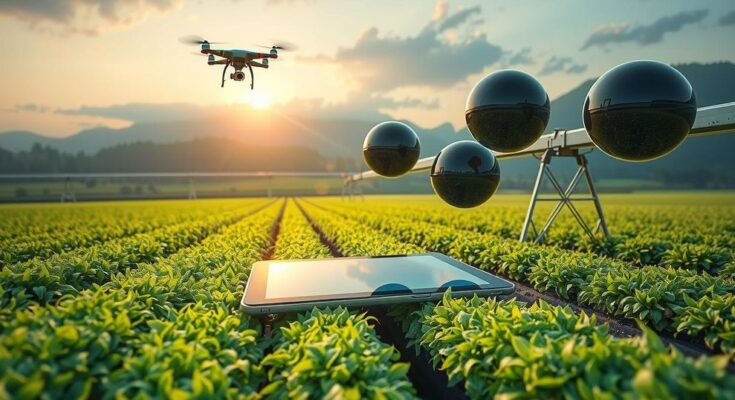KALRO has digitized agricultural innovations for easier farmer access via mobile and digital platforms. Dr. Eliud Kireger highlighted this initiative’s goal to complement underperforming extension officers during a media briefing prior to CGIAR Science Week. The organization aims to address climate change impacts by showcasing new technologies to improve food security for farmers. Nairobi’s role as a hub for agricultural research further emphasizes Kenya’s significance in this field.
The Kenya Agricultural and Livestock Research Organization (KALRO) has digitized its agricultural innovations, providing farmers with easy access through mobile and digital platforms. Dr. Eliud Kireger, KALRO’s Director General, announced this initiative during a Nairobi media briefing held before the upcoming CGIAR Science Week scheduled for April 7-12, which aims to address the gaps left by underperforming extension officers. “For us to help our farmers, we have ventured digitizing all our innovations so that they are easily accessible on digital platforms, whether it is mobile or through ICT,” stated Dr. Kireger.
This digitization aligns with the urgent need to combat climate change, which significantly impacts small-scale farmers. Dr. Kireger emphasized the importance of showcasing locally-developed technologies during the science week, stating, “We will be showcasing the technologies that we have developed both within and elsewhere, and those that are ready to be taken up by our farmers to increase our food and nutrition security.” He noted that agriculture can serve as a solution to climate challenges despite its current portrayal as a primary greenhouse gas emitter.
Nairobi’s selection as the host for the science week signifies Kenya’s critical role in agricultural research across Africa. Dr. Kireger remarked, “Other partners are going to showcase models in agricultural transformation that have worked elsewhere.” He further explained that KALRO collaborates with partners like CGIAR to fund research aimed at creating applicable technologies for sub-Saharan Africa, particularly in regions with similar climatic and socioeconomic conditions.
Drought-tolerant climate technologies are crucial as they directly affect both farmers and the national economy. Dr. Kireger connected agricultural performance to GDP, stating, “That’s why whenever we have droughts, and our agricultural production goes down, it directly affects the Gross Domestic Product (GDP).” He identified the access to technology as a major challenge in the agricultural sector, especially in sub-Saharan Africa.
The upcoming Science Week will showcase practical innovations including climate-smart technologies and drought-tolerant crops appropriate for various farming scales. Dr. Kireger promised, “You are going to see technologies for mitigating new pests and diseases that have come with climate change.” He believes that equipping farmers with the right tools will significantly enhance productivity and food security in Kenya.
He urged the government to assist farmers in acquiring quality seeds and inputs that remain financially accessible. Dr. Ismahane Elouafi, Executive Managing Director of CGIAR, stressed the need for local innovation and manufacturing environments to support agricultural growth, stating, “We need to create an innovation and a vibrant environment for innovation, so that the Small Micro Enterprises can thrive locally.” As Kenya implements climate-smart villages, which integrate diverse farming methods with technology, farmers increasingly demand certified seeds, highlighting the importance of quality and innovation in agricultural practices.
The Kenya Agricultural and Livestock Research Organization’s initiative to digitize agricultural technologies aims to enhance farmer access and productivity amidst challenges posed by climate change. This strategic move, highlighted during the upcoming CGIAR Science Week, underscores the necessity for innovation and collaboration in agriculture. By showcasing advanced technologies and emphasizing their importance, KALRO seeks to revolutionize farming practices in Kenya and the broader sub-Saharan region.
Original Source: africasciencenews.org




